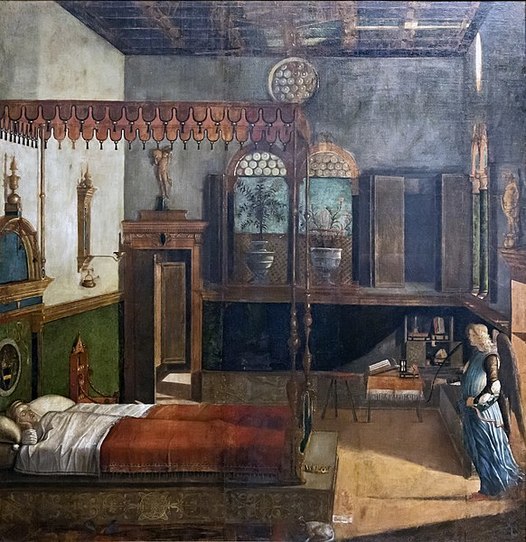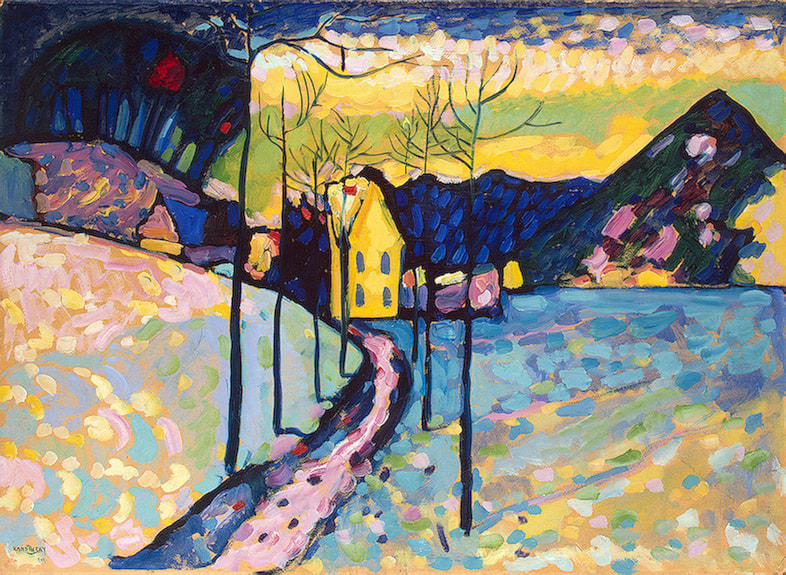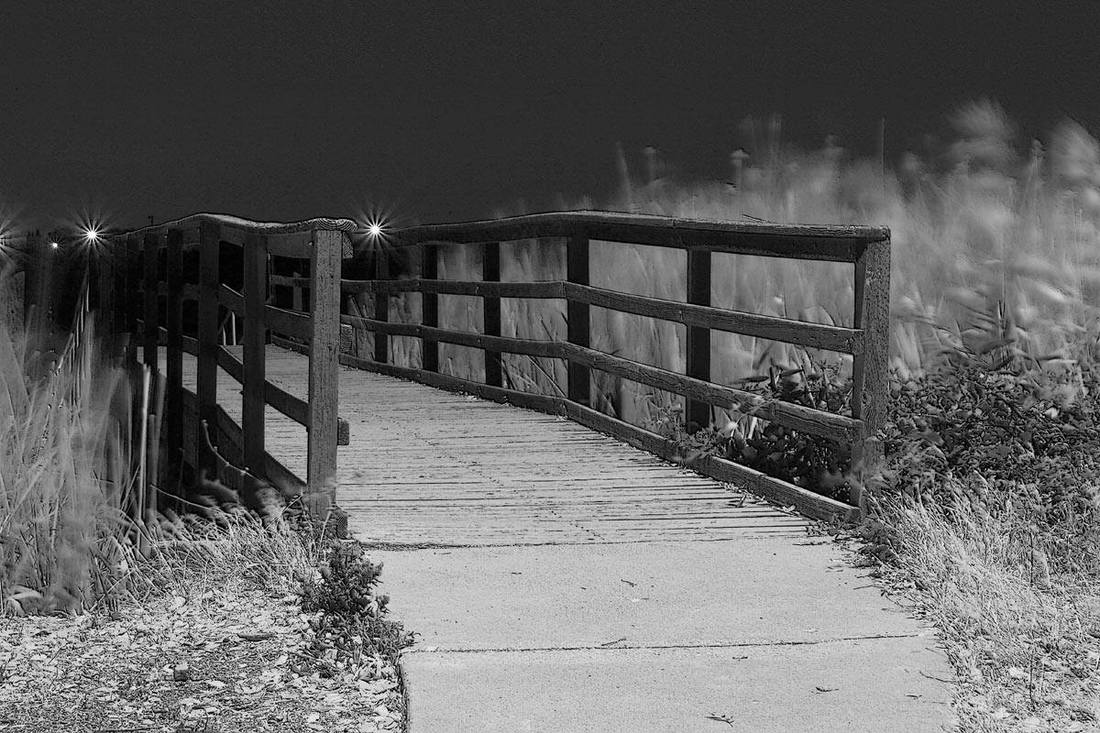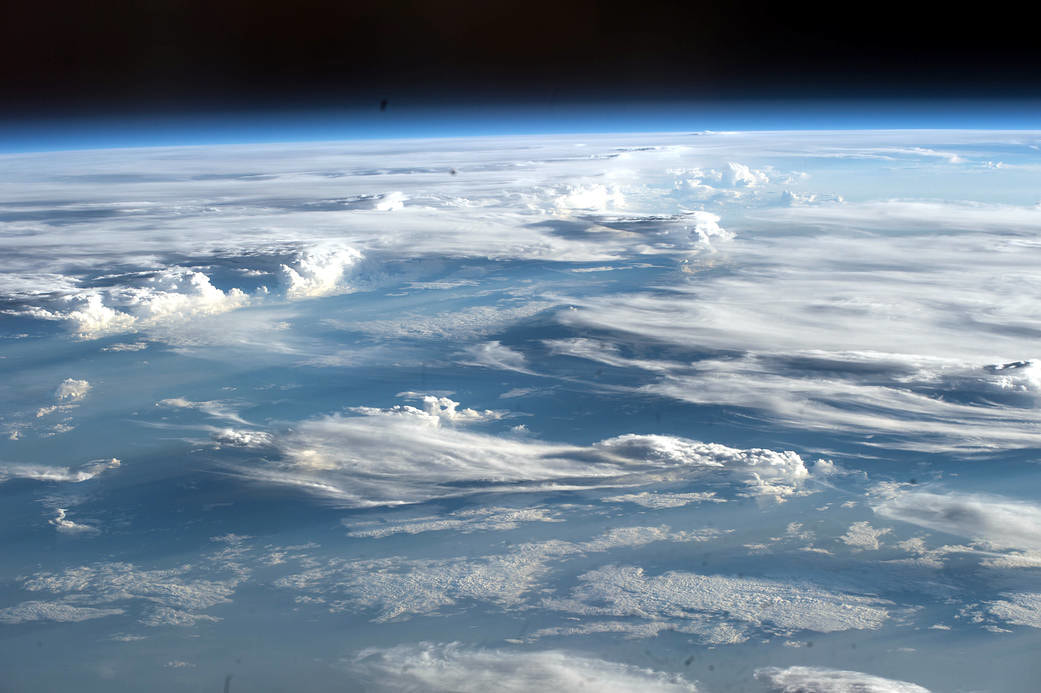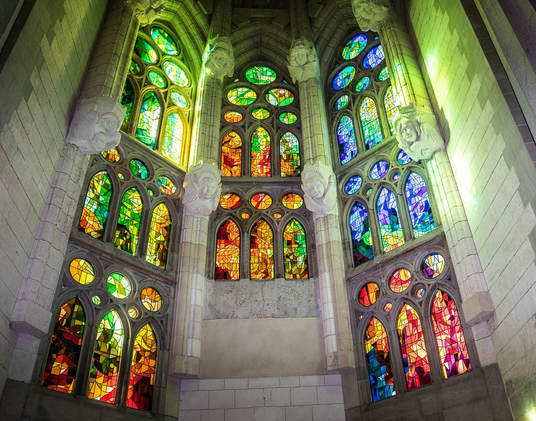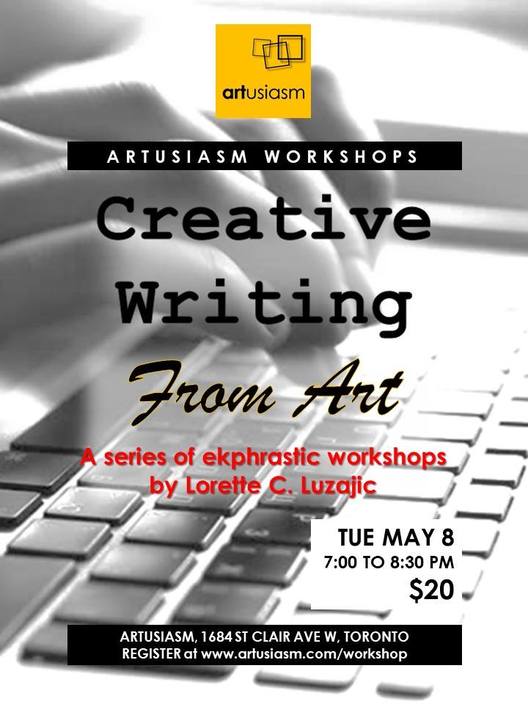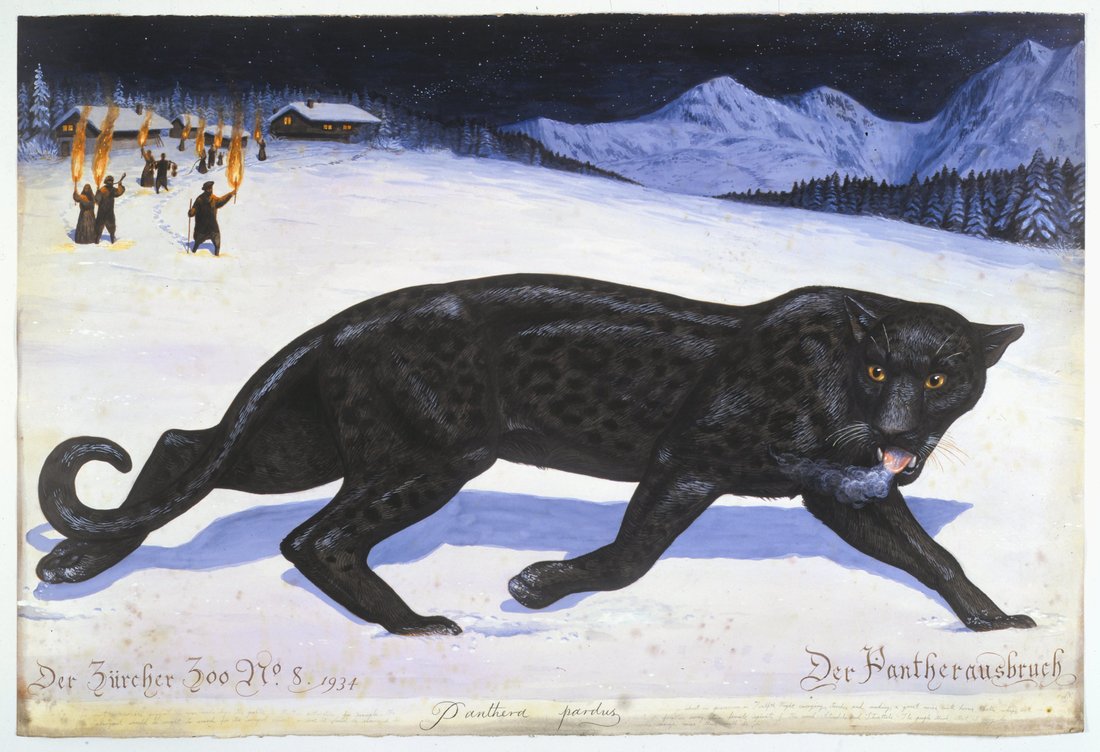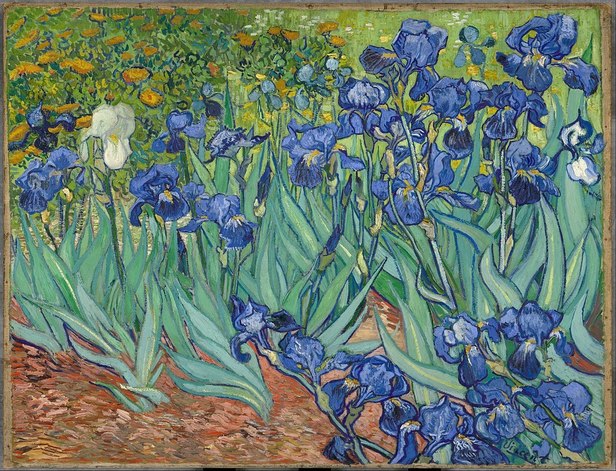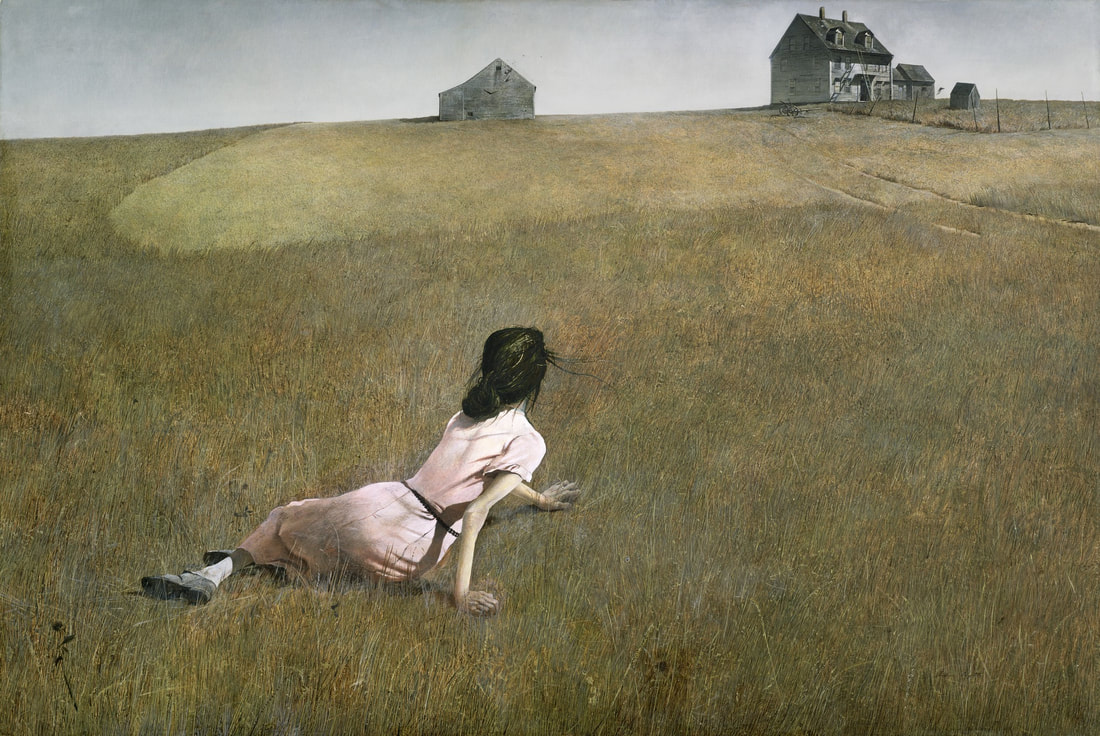|
Dream of St. Ursula She has the perfect room Even without the angel The green and red walls A myrtle tree and geraniums The large bed empty except for her small sleeping body The angel has come to announce her purity And later 10,0000 virgins will follow her to death But she doesn’t know this yet She enjoys the empty bed The lovely room The sunlight streams in behind the angel The angel leans forward Her palm upraised Her wings a shadow behind her St. Ursula does not wake and only dreams of the angel’s presence This is the room of my dreams I blaspheme and cut the picture right out of the art book And put the picture in another book Hidden as though it were the Kama Sutra And it was only today that I remembered As a child I dreamt of purity Of a large bed that was my own To wake, to lie awake, to sleep, to read A beautiful room with plants Silent with books And dark corners Forty years have passed Today I remembered St Ursula And bought a myrtle tree Melanie DuBose Melanie DuBose is a writer and filmmaker from Los Angeles. A graduate of the UCLA film school, she is an Activate Arts LA Fellow and works towards equity in arts education. She has won a number of odd awards including one from the National Weather Association.
0 Comments
Saints
Fields alongside road bubble with splotches lying on grass lit from underneath. As twilight covers distance mountains boil with purple spaces between trees gleam like stained glass forest fills with deep hues-- saints of night. Taunja Thomson Taunja Thomson’s work has most recently appeared in These Fragile Lilacs and Alcyone. Three of her poems have been nominated for Pushcart Awards: “Seahorse and Moon” in 2005, “I Walked Out in January” in 2016, and “Strum and Lull” in 2018. She has co-authored Frame and Mount the Sky, a chapbook of ekphrastic poetry (2017); her chapbook Strum and Lull placed in Golden Walkman’s 2017 chapbook competition; and her chapbook The Profusion is due out in January of 2019. She has a writer’s page at https://www.facebook.com/TaunjaThomsonWriter/. A Narrow Bridge
“The whole world is a narrow bridge; the important thing is not to be afraid.” Rabbi Chaim Nachman of Bratslav (1772-1810) Adults immerse themselves in prayer, their heads humbly bowed for God-powered strength to navigate a narrow bridge without fear of failing or falling. Children belt out campfire songs echoing the words of their elders, parroting their parents brave enough only to pray.Their prepubescent voices crack like firespit as marshmallows drip thickly from snapped twigs. They are not haunted by hatred and taunts, but untethered by youth, where bridges are for chasing, running, racing, and high-fiving at the finish, where plunging into calm water is carefree, riptides and high tides are undaunting, and terror is for the mortal. They are the fearless -- the young -- myopic to the day when their own hair will gray and their own children will defy reliance on prayer that will cloak them in safety. For now, innocence and unspent spirit have no time for trepidation. There is a narrow bridge to cross. Shelly Blankman Shelly Blankman and her husband Jon are empty-nesters, who live in Columbia, Maryland with their four rescue cats and one foster dog. They have two sons, Richard of New York and Joshua of San Antonio. Shelly's career has followed paths in public relations and journalism, but her first love has always been poetry. She also enjoys scrapbooking and cardmaking ... when she's not refereeing cats, that is. Space Station Crew Sees Lots of Clouds
From up here it’s an oceanic birthday cake these frosted tufts of cloud makes you want to poke your finger in and lick it right across the sugary mounds of chemical-sweet butterscotch icing gold-plated by the setting sun then suck it through your teeth and tongue. Up here we get lonely for such things. Marc Alan Di Martino Marc Alan Di Martino's poems have been published in Rattle, Poets Reading the News, Poetry Salzburg Review and other places. He lives in Italy, where he teaches English as a foreign language. Don't Go Near the Water
"Suddenly I had the revelation of how magical my pond is. I took up my palette. Since that time I have scarcely had any other models." Claude Monet (1840 – 1926) Mesmerized by Morning with Willows, I step closer, trip over the low guardrail and plunge toward the pond. I grab a branch of the nearest tree and dangle there, a panicking pendulum swinging above the floating lilies and swirls of clouds and insects. I glance helplessly around the large oval room at the other three giant Monet canvases and the milling museum goers. Wind ripples the water below my feet as I thrash noisily among the multi-coloured branches. Hello, over here, I scream, but no one hears. My arms ache. A curious blue frog watches from below. A solitary mademoiselle approaches and stares head-on at my plight. Help, I have fallen into this painting. She looks puzzled and asks me something in French. Apparently not understanding my frantic response, she wanders away to join her family for a picnic lunch in the garden outside. Ken Kibler Ken Kibler is a retired nuclear physicist, time-traveler, and sporadic writer who foists occasional self-published poetry collections on unsuspecting, but sometimes appreciative, acquaintances. Sagrada Familia Granite columns burst into trees, a drenched forest pours light in endless supply, and you consider lifting a chalice from Saint Francis as you wander beneath pillars that swoop like whooping cranes while a crest floats a thorn-less crown above your head. His hands sculpted everything they could touch: chimneys and dinner plates, metal gates curvaceous scroll, gothic alphabets sprouting feet and wings. In webs and crevices he felt beauty breathe; in dusty remains he saw starburst resembling flowers resembling longing, a bell tower to join heaven and earth. You’re lost in this grove where panes of glass sift saffron and lavender. Golden orbs nestle in clefts like suns that see in all directions, see you among the many passing through, stepping between shadows, shape-shifting doubt, and all you can’t hold… Jennifer Markell Editor's note: To see and learn more about Sagrada Familia and Antonio Gaudi, click here. Jennifer Markell’s first poetry collection, Samsara, was published in 2014 by Turning Point. It was named a “Must Read Book of Poetry” for 2015 by the Massachusetts Book Awards. It was also a Finalist in the Next Generation Indie Book Awards. Markell won the Barbara Bradley award in 2015 and the Firman Houghton award in 2016 from the New England Poetry Club. Her work has appeared in publications including Ars Medica, Consequence, The Hawaii Pacific Review, Rhino, Tinderbox, and The Women’s Review of Books. Markell works as a psychotherapist with special interest in therapeutic uses of writing. http://jennifermarkell.com/ The Ekphrastic Review is pleased to announce workshops in Toronto at Artusiasm Gallery.
https://www.artusiasm.com/creativewriting The Panther’s Tale
In 1934 a female black panther escapes from the Zürich Tiergarten and survives through two months of a Swiss winter, before being shot for food by an itinerant labourer in the mountains near Saint Gallen. The animal’s escape and disappearance quickly become sensational news. During the time the panther is at large, the authorities receive hundreds of reports from people claiming to have seen the animal, some from the most far-flung corners of the country and beyond. There is never a confirmed sighting. Suspicious tracks in the snow always turn out to be those of dogs. A certain religious sect asserts that the panther is demonic and should be exorcized by a pastor from their church. A clairvoyant from Paris travels to Zürich and offers her help to the searchers, claiming she’s had a vision of the panther hiding in a cave of ice high up on a glacier. The clairvoyant is politely asked to return home. The panther herself is aware of none of this. She survives by way of her instinctual stealth and her learned distrust of human beings. She hunts mice, voles, and hares in the snow-mantled forest, as far from human habitation as possible, and makes herself a den under the roots of an immense, ancient stone pine, from which she emerges only when hunger drives her. Her time in captivity has does nothing to lessen her innate distrust of humans, but where they are found, there is always food. She leaves her den and prowls slowly down the mountain, further into their territory, until she comes to a small graveyard ringed by trees. Hunkered in the concealment of a thorn bush at the edge of the burial ground she can smell a freshly dead human, somewhere close by. Eating things she has not killed herself is not in her nature, but surviving is. Still, she must be careful. She remembers how the humans first caught her. How they had a thing made of wrong-smelling vines that fell on her so that she couldn’t get away. She has seen the work of their fire sticks and understands that it means death. She will not move until she’s certain there is no hidden danger here. Then humans come. There are many of them, some carrying a thing made of pieces of tree. They carry the thing to a hole in the ground. They set it down. One of them utters that strange flat barking that only humans make. Some make other noises, like the cries and whimpers the panther heard from other caged creatures around her in the place the humans kept her before she escaped. Most of the humans leave. Two stay behind and cover the hole with earth. Then they leave, too. The panther waits until it is well past dark and then she creeps into the burial ground. She reaches the fresh grave and slowly, with many pauses to listen, digs away the loose soil. She claws and bites at the flimsy thing made of wood and two of its pieces move apart and now she can get at what’s inside. The panther hauls it out and drags it to her hiding place to eat. The dead human is small. It was weak and sickly, the panther knows when she tastes its flesh, which is dry and joyless fare. But it will sustain her. Later a fall of large wet snowflakes patter softly on the bare branches, on the panther’s fur, on the damp earth. The panther would rest after her meal, but now she can hear them returning. Many of them. She can see their angry fires flicker through the trees. The panther gathers herself and springs away. She is here, now, a dark shape against the snow, her breath the ghost of what she cannot tell us. She is still at large, in the place we find ourselves exiled from by our torches, our words. We can only glimpse her through a thicket of brush strokes, at the edge of a great silence. Thomas Wharton Thomas Wharton's novels and stories have been published in Canada, the US, the UK, France, Italy, Japan, and other countries. His first novel, Icefields, received the 1996 Commonwealth Writers’ Prize for Best First Book (Canada and Caribbean Division), and won the Grand Prize at the 1995 Banff Mountain Book Festival. His collection of stories, The Logogryph, was shortlisted for the International Dublin Literary Award. Temperate
in an open field on a temperate day in the middle of May a batch of purple irises stand alongside their counterparts blossoming for the sky above to witness-- Alexa Findlay Alexa Findlay spends most of her time writing fiction and poetry. She is the Founder and Editor-in-Chief of three online literary magazines. She is obsessed with Disney and Jurassic Park. Her work has been featured in Pomona Valley Review, Better than Starbucks Magazine, Adelaide Literary Magazine, Halcyon Days, Grotesque Magazine, The Quail Bell Magazine, Vox Poetica, amongst others. Christina Lying in the Grass With green eyes rises from her dream, imprints of sleep fade from her skin. She stands, walks to the door. Window sills have wept flakes of paint in the long wind. She pushes it open, floors flowered with coloured wallpaper, a stack of kindling piled by the fire place. An open diary reads Paint Christina. One glass bottle of ketchup on the table, a deep red and nothing else bar the bird dangling between house and shed muzzled with brush strokes. Christina wakes, walks. I had the strangest dream. I was a bird with broken wings crawling through the dirt. He who painted and ended her, full of useless bones and flowing hair, framed her like a man frames a woman in his mind, unequalled. From the shining blades she wakes. I had the strangest dream. David Ross Linklater David Ross Linklater is a poet from the Highlands of Scotland living in Glasgow. He is a graduate from the University of Glasgow's Creative Writing MLitt. He is the recipient of a Donald Dewar Arts Award and was shortlisted for a New Writers Award in 2015. His pamphlet 'Black Box' was published in February 2018 by Speculative Books. Follow him on Twitter @DavidRossLinkla |
The Ekphrastic Review
COOKIES/PRIVACY
This site uses cookies to deliver your best navigation experience this time and next. Continuing here means you consent to cookies. Thank you. Join us on Facebook:
July 2024
|
